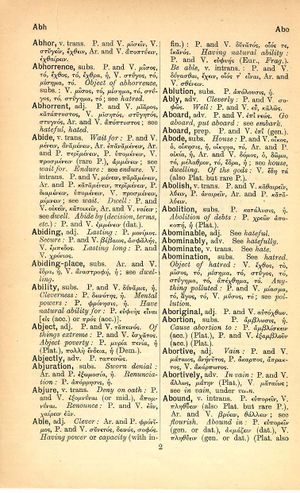able: Difference between revisions
From LSJ
ἀλλ' εἰ μὲν ἁγνόν ἐστί σοι Πειθοῦς σέβας, γλώσσης ἐμῆς μείλιγμα καὶ θελκτήριον → but if you have holy reverence for Persuasion, the sweetness and charm of my tongue
mNo edit summary |
mNo edit summary |
||
| Line 8: | Line 8: | ||
<b class="b2">Having natural ability</b>: P. and V. [[εὐφυής]] (Eur., Frag.). | <b class="b2">Having natural ability</b>: P. and V. [[εὐφυής]] (Eur., Frag.). | ||
<b class="b2">Be able</b>, v. intrans.: P. and V. [[δύναμαι|δύνασθαι]], ἔχειν, οἷός τʼ εἶναι, Ar. and V. σθένειν | <b class="b2">Be able</b>, v. intrans.: P. and V. [[δύναμαι|δύνασθαι]], ἔχειν, οἷός τʼ εἶναι, Ar. and V. σθένειν. | ||
}} | }} | ||
Revision as of 17:36, 22 September 2017
English > Greek (Woodhouse)
adj.
Clever: Ar. and P. φρόνιμος, P. and V. συνετός, δεινός, σοφός.
Having power or capacity (with infin.): P. and V. δυνατός, οἷός τε, ἱκανός.
Having natural ability: P. and V. εὐφυής (Eur., Frag.).
Be able, v. intrans.: P. and V. δύνασθαι, ἔχειν, οἷός τʼ εἶναι, Ar. and V. σθένειν.

